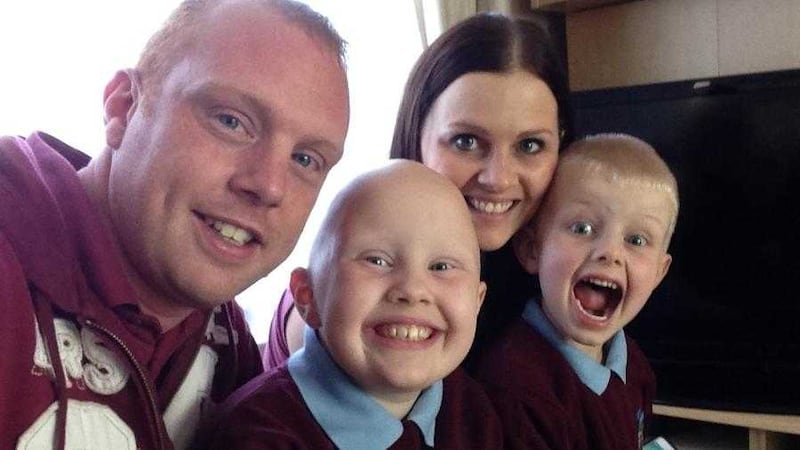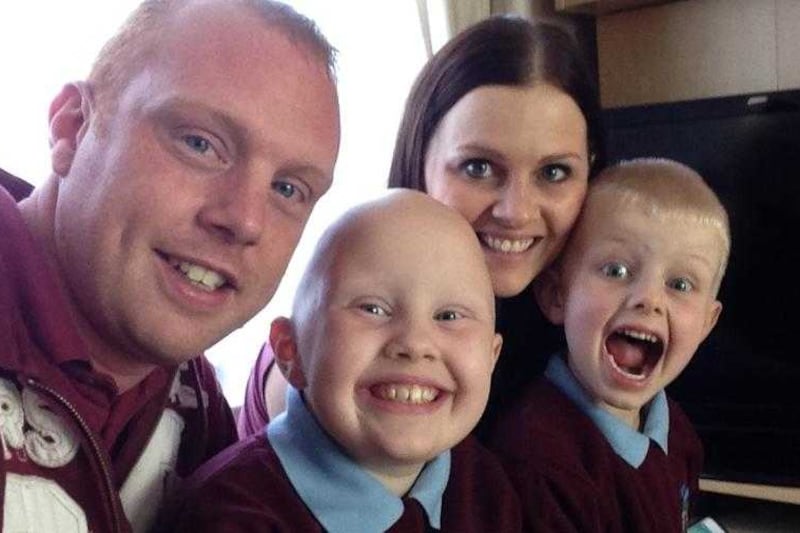EDEN Long is a beautiful, bubbly eight-year-old who loves life and looked like a princess when she was a flower girl at her aunt's recent wedding. To her friends she is just like any other child, but to onlookers Eden often gets a second glance – because Eden has no hair.
The Greyabbey girl is one of two per cent of the population living with alopecia, an auto-immune hair-loss disease that affects men, women and children of any age. The onset of the hair loss is often sudden, random and frequently recurrent. There are a number of different types of alopecia which determine whether the hair loss is in patches, affects the complete scalp hair or even the entire body.
Alopecia Cicatricial is a rare type of alopecia that destroys the hair follicle permanently, but with the other types hair can regrow again. At present, there is no known cure for any form of alopecia, although there are various treatments available to help promote hair regrowth.
While the disease itself is not damaging to bodily health in any other way, apart from possible changes in the appearance of the nails, coping with hair loss can prove challenging.
Eden was only two when her light blonde fluffy hair gradually thinned out and failed to regrow. She has grown up with her baldness and never seemed to let it worry her. However, for her parents Gareth and Christine is was difficult to come to terms with.
"When the doctor told Gareth and Christine that Eden had alopecia they were devastated. Christine described it as grieving. But what made it worse was that they had no counsellors or other parents in their situation they could turn to," recalls Eden's uncle Stuart.
What helped the Long family come to terms with Eden's diagnosis was throwing their home open to family and friends for two consecutive evenings where they shared their thoughts and feelings and talked openly about their little girl. The result of these get-togethers was the birth of Helping Alopecia Trust (HAT).
The only charity in Northern Ireland devoted to helping people affected by alopecia, it's aim is to offer support to individuals, family and friends of those with alopecia and to raise awareness of the condition among the public. The charity holds monthly meetings and various fun days and weekends throughout the year.
The public's reaction, especially to older children and teenagers can be very harmful. And as well as raising awareness of the condition, the charity give presentations to primary schools to educate children from a young age about alopecia and how it affects those with the condition. Inspired by Eden and other's in the group, they also have produced a children's story book, Alecia: A Girl with no hair, which gives a positive message on living with alopecia.
An increasing number of celebrities have spoken out about the condition and not let their baldness hold them back. These include Swansea footballer Jonjo Shelvey, Olympic gold medal cyclist Joanna Roswell, Little Britain comedian Matt Lucas and Scottish television personality Gail Porter, whose hair has recently started to regrow after a decade of baldness.
"We want to get across the message that even though you've lost your hair you can still be happy and succeed in life. When we do our school talks, we tell kids it doesn't stop you playing for England, winning an Olympic gold medal or a top comedian," says Stuart.
In this Alopecia Awareness Month the charity is keen to spread awareness of alopecia and to underline the fact that it's not something to be ashamed of, nor it is contagious, as well as to encourage people that if they know someone a child with no hair to think twice and not assume they have cancer.
While a parent may not be able to cure, stop, or correct the hair loss, they can influence how their child handles the hair loss and teach them ways to cope and feel confident talking about their alopecia to their peers. For some, especially older children, they may want to focus on camouflaging the baldness with scarves, headbands and hats in order to improve their self-confidence.
Now in primary five, most of the time Eden doesn't wear anything on her head, except for sun hats during the summer. Having always been given the freedom to choose whether or not to wear a wig, she uses the head piece more as a fashion accessory, putting it on when getting dressed up for occasions like her school disco.
And when she does, it can still bring a tear to the eye of her uncle, who recalls the first time he saw her with long blonde hair.
"For years I had never seen her wear a wig and there was a a fancy dress party and I was wearing a wig and I looked around and she was standing with her wig up. It really chocked me up".
For further information visit helpingalopeciatrust.com



